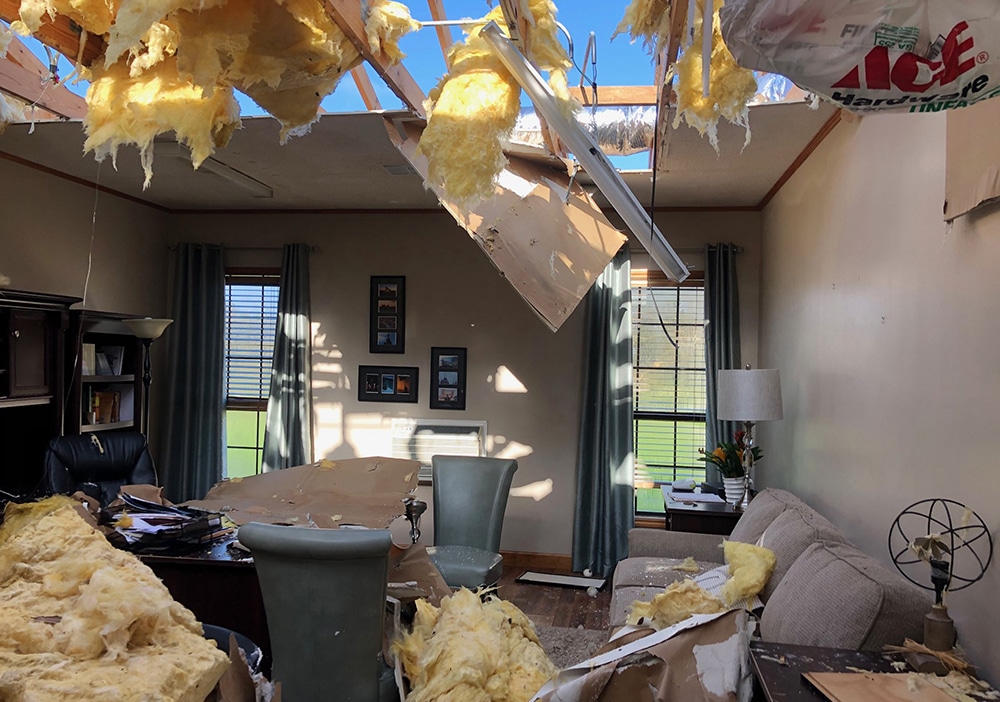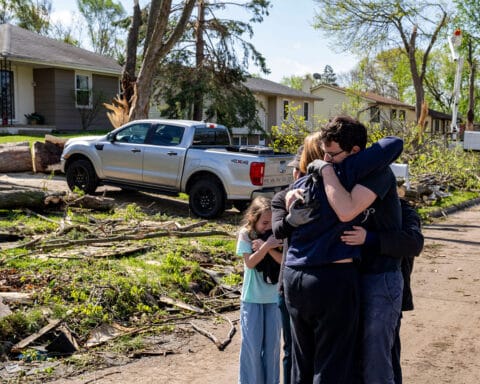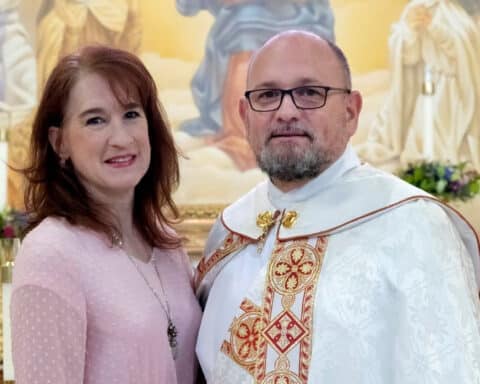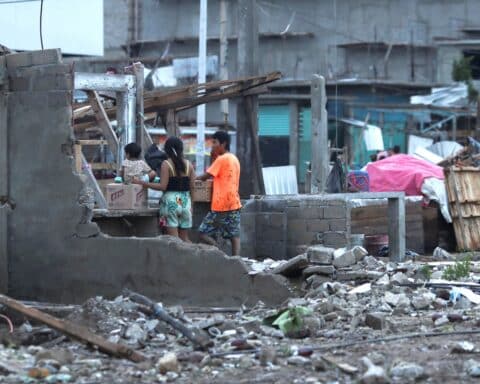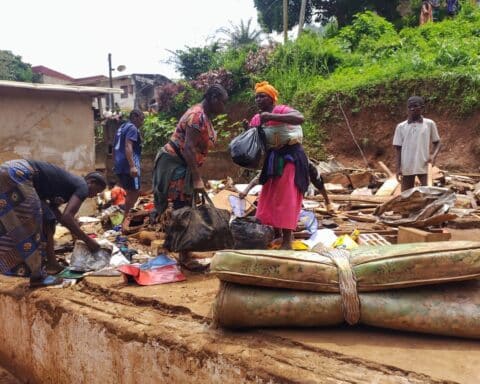Nothing in seminary could have prepared Father Andrew DeRouen for his first three months as a priest.
“A pandemic, now a hurricane,” said Father DeRouen, 27, a priest of the Diocese of Lake Charles, Louisiana, who was ordained in June.
On Aug. 27, Hurricane Laura, a devastating Category 4 hurricane with sustained winds of more than 150 miles per hour, made landfall in southwestern Louisiana, tearing roofs off buildings, snapping trees like twigs and leaving a huge swath of the region underwater.
The hurricane is estimated to have caused $8.7 billion of damages in southwestern Louisiana and southeastern Texas near the Gulf of Mexico. At least 29 people in the United States died because of the storm, according to news reports.
Father DeRouen, who was displaced when a tree destroyed the rectory where he was living, is seeing the damage firsthand. Everyday he drives Bishop Glen John Provost of Lake Charles to visit devastated parishes throughout the diocese. He says some areas resemble foreign mission fields because of the damaged infrastructure.
“About 16 priests have been displaced. Twenty rectories around the diocese have been deemed uninhabitable. It’s a crazy time,” said Father DeRouen, a native of the Lakes Charles community, which is located 150 miles east of Houston and 200 miles west of New Orleans.
Father DeRouen spoke with Our Sunday Visitor after another grueling day of traveling through the devastated region.
OSV: What is the scale of the devastation that you are seeing?
Father Andrew DeRouen: The hurricane took whole roofs off of houses. The sides of walls on buildings have collapsed. We’re seeing hundreds if not thousands, probably closer to tens of thousands, of downed trees. That presents a utility problem, so obviously power lines are tangled up in trees. Getting power restored to the area is a huge problem. You’re starting from scratch in a lot of places with wires, utility poles and transformers off-line.
And because there’s no power, that means there’s no gas at the pump, so we have to go close to an hour outside of the city center if you’re looking for places to have short lines for gasoline. There’s also no water. I mean, it’s slowly coming back, but we lost a water tower that supplied water to much of the city that we have to have a new one reconstructed to effectively get water back on line.
OSV: How did Hurricane Laura impact you directly?
Father DeRouen: I was a parochial vicar assigned to two parishes, St. Theodore Church and St. Pius X in Ragley. Both sustained so much damage that I went from having two parishes to no parish to work or live at. At the rectory where I was staying, two pine trees fell on the house, crashing through the kitchen and the living room. The building has been recently condemned, it’s completely uninhabitable, and it’s scheduled to be bulldozed.
At St. Theodore Church, the windows on top of the sanctuary were blown out. Some of the doors down below were blown out, and that created a vacuum of water and debris that pretty much trashed the interior of the church. At St. Pius X, which has three buildings on campus, the CCD building’s roof was completely blown out. The other two buildings sustained considerable damage, but most of it is because of water. Parts of the church roof were damaged, and that created a water intrusion which makes the building uninhabitable because of mold growth and the potential for sheet rock collapse.
OSV: What is your assignment now?
Father DeRouen: The opportunity came up for me to return to the diocese, to live at another rectory with a spare bedroom that sustained less damage, and to bring the bishop to see all the churches that are his. He needs someone to drive him in some of the hazardous conditions. The coastal parishes take about an hour to an hour-and-a-half to get to, and with traffic that’s an added frustration at times. But we’re able to get to those places pretty effectively. The roads for the most part have been cleared around the diocese. In the afternoon, I return the bishop to his residence and I spend most of the afternoon trying to coordinate what I’m going to communicate to people about food distribution the following morning.
OSV: What does your day look like tomorrow?
Father DeRouen: I’m going [on Sept. 4] to probably the worst-hit parish that is directly on the coast of the Gulf of Mexico. It’s also one of the oldest parishes in the diocese. They were hit with a tremendous storm surge since they were on that side of the storm. The parish church has a bell tower in the front, which miraculously is still standing with a statue of Our Lady in its alcove, but not without tremendous structural damage. There are no doors. There are no walls taller than nine feet. Everything has just been wiped out. There are only a few pillars at the corners of each of the walls that are holding up the rest of the structure. It’s as if the Gulf of Mexico extended through the church and probably another 20 miles inland.
OSV: What does the bishop do on those visits?
Father DeRouen: The bishop is very observant. In a sense, there is nothing that can be done immediately, and he knows that. This takes a tremendous amount of time and money and effort to recover, if they do recover at all. The bishop is very well aware of that. But part of suffering with the people who are so in love with their parish, who have grown to love their parish, is just being there to observe the destruction.
Just because these parishes are in dangerous areas to get to, the bishop wants to be there. So really it’s an honor for me to bring him to his parishes just so he can suffer a little bit with the faithful just by being there. He wants to meet with each of the pastors he’s visiting just to see if they’ve learned any new information about the help they need, what people in the affected areas need at the moment, the systems they have set up to help people, whether or not they’ve set up groups to come in and serve hot meals, whether they’ve met with insurance adjusters. The bishop is very attentive, but most especially he wants to be present to the parishes and their pastors, because he is the pastor of pastors.
OSV: What are some of the pressing needs you are seeing?
Father DeRouen: At the moment, it’s tarps. There is such a shortage of blue tarps around the area because we’ve depleted the resources we had in the Lake Charles area and the surrounding cities. People can’t continue to live in their houses without a roof effectively over their head. They’re just trying to secure the rest of what’s been left behind from the elements that they’re no longer protected by because of the lack of a roof.
The next thing would be generators. Because we have power out, people effectively can’t live in Lake Charles if they don’t have a generator. And by the way, it’s not as safe to live here for a number of reasons, but mostly because of a lack of power and other utilities. Many people can’t live here, so they’re commuting from outside the city to work on their houses, some from up to two hours away because they’re staying with family in Lafayette or Houston, somewhere that has the utilities they need. They want to come home and just take a shower, and they can’t do that for another 100 to 150 miles.
OSV: What can people do to help?
Father DeRouen: We have a diocesan relief fund that you can access on our diocesan website (lcdiocese.org). There is also a diocesan emergency hotline operated by one of the sisters from Catholic Charities (337-888-6026). If you’re within eight hours of Lake Charles, it is feasible for you and your parish to make a mission trip to help us with a variety of tasks that need to be done. Sometimes we need a group for manual labor, to chainsaw a bunch of trees or pass out food. For those further out, they can still make a contribution on the diocesan website. There is a donation form that has been linked to the website.
Brian Fraga is a contributing editor for Our Sunday Visitor.

